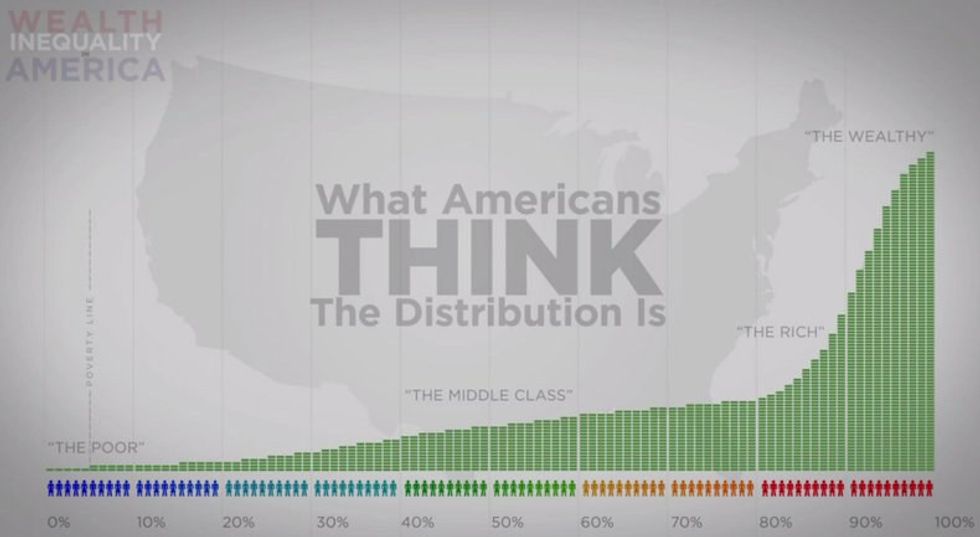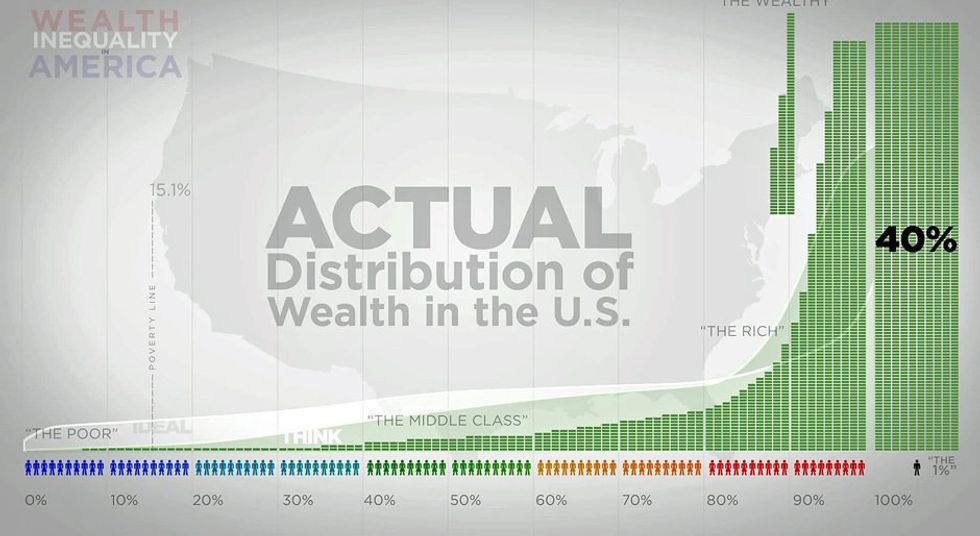When the Western Roman Empire fell in the late 300s, it was due to many contributing factors including invasion, over-expansion, corruption, and economic troubles. The economics troubles in question involved a growing gap between the rich and the poor, oppressive taxation, and inflation. As Rome looked to pay its debts, finance its wars and expansion, and grow its economy, it turned to tax its citizens.
To avoid paying these heavy taxes, many members of the Rome’s wealthiest class moved to the countryside, and so the burden fell upon the laborers, craftsmen, and small farmers. As taxes went up, so did the prices of goods, services, and materials, while at the same time the value of Roman money fell into decline.
With a wealthy upper class avoiding taxation and refusing to invest in helping small farmers and businessmen, the majority of Roman wealth, the one percent, was balanced precariously on the over-taxed class of average people whose money wasn’t worth enough to pay for everything they needed. With invasion from barbarians hovering as a constant threat and over-expansion resulting in too much demand for the labor resources at hand to deal with, the precarious balance of the Roman economy was bound to come crashing down sooner or later.
Here we are, over 1700 years later, experiencing the same widening gap between our rich and poor as the Romans did. Prices of goods and services are rising, but wages for working class families have remained relatively the same. The rich are given tax breaks, and when their tax rates rise, as they did under Bill Clinton, they simply move their money into off-shore bank accounts—the countryside of the American economy—in order to avoid taxation.
If anything, we should have at least learned that a good economy relies on a strong middle-class, but it seems that those who vote on laws and regulations regarding taxation and wages continue to believe that you can build a strong economy from the top down, and the fact of the matter is that you can’t.
You may have seen the video comparing what a survey of roughly 5,000 Americans thought was the wealth distribution in this country with the actual wealth distribution. Shockingly, what American’s thought was the wealth distribution—the top 20 percent of Americans own over 50 percent of the wealth while the bottom 40 percent own roughly 10 percent of the wealth—while rather inequitable as it was, did not even come close the grossly unequal reality of wealth distribution.
In this country, the top one percent of people—roughly three million of the United States estimated 322,762,018 population—own and control 40 percent of the wealth in our country. Meanwhile, the bottom 80 percent –almost 260 billion Americans—split a mere seven percent of our countries wealth between them. While the super-rich one percent are able to live their lives in comfort and luxury, the bottom 80 percent worry about whether they’ll be able to put food on the table or support their kid's dreams of college.
At the heart of our skewed wealth distribution, where the rich just keep getting richer while the poverty line crawls up into the lower middle class, is trickle-down economics. At its core, trickle-down economics function on the basis that giving the wealthiest people in our country tax breaks means that they will earn more and that they will then turn around and invest some of their wealth into businesses and institutions that will help to create better-paying jobs for the working class.
In other words, as its name would suggest, trickle-down economics—also called Reaganomics after their biggest presidential backer—intends to give more wealth to the rich in the hopes that, when they invest, their wealth will open up opportunities for the working class and “trickle down” into the lower 80 percent. According to a study catalogued in the Huffington Post, “the benefits don’t trickle down.”
In a research study done by the International Monetary Fund (IMF), it was discovered that “when the wealthiest 20 percent see their share of income rise by one per cent, the economy grows 0.08 percentage points slower over the next five years.” On the other hand, “[w]hen the poorest 20 percent increase their share of total income by one per cent, the economy grows 0.38 percentage points faster.”
“Translation,” author Daniel Tencer writes, “Give tax breaks or higher wages to the poor, and the economy will grow. Give tax breaks or higher incomes to the rich, and you reduce economic growth.”
According to the IMF researchers, growing inequality is “the defining challenge of our time,” and it only when we realize that our focus should be on developing a “more progressive” tax system and increasing access to education and healthcare, rather than giving the one percent another tax break, that we will begin to see a stronger and steadier economy.
We are heading in the right direction with plans like the Affordable Care Act, and politicians who have the dedication it takes to fight for affordable community college for families who make less than $125,000 , because no one should be denied health care or an education. As citizens of the United States, we must continue to make our voices heard and push for a continued change away from trickle-down economics and a greater availability of jobs, health care, and education for all Americans that starts with a strong middle-class. Rome wasn’t built in a day, and neither is a good economy.









 mr and mrs potato head
StableDiffusion
mr and mrs potato head
StableDiffusion










